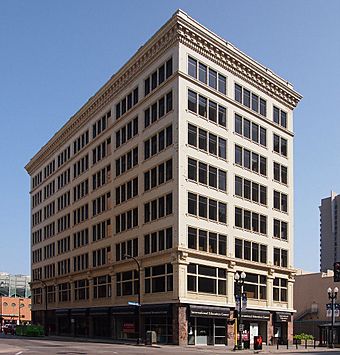Lincoln Bank Building facts for kids
Quick facts for kids |
|
|
Lincoln Bank Building
|
|

The Lincoln Bank Building from the south
|
|
| Location | 730 Hennepin Avenue, Minneapolis, Minnesota |
|---|---|
| Area | 0.2 acres (0.081 ha) |
| Built | 1921 |
| Architect | Long, Lamoreaux and Long |
| Architectural style | Commercial Style |
| NRHP reference No. | 12000846 |
| Added to NRHP | October 15, 2012 |
The Lincoln Bank Building is a cool old building located on Hennepin Avenue in downtown Minneapolis, Minnesota. It's a special place because it was added to the National Register of Historic Places in October 2012. This means it's an important historical site worth protecting!
Contents
Why was the Lincoln Bank Building created?
The Lincoln National Bank was started in 1917. A man named Harry Pence, who was very successful in the car business, helped create it. He and others first wanted to call it the "Second National Bank." But the government said no because it wasn't actually the second bank ever started.
So, Pence decided to name it after Abraham Lincoln. He thought Lincoln's name showed strength, loyalty, and trustworthiness. These were all qualities he wanted his new bank to have.
Where was the bank located?
The bank's location was picked to help car businesses and other shops on Hennepin Avenue. It was also close to the nearby warehouse district. The main banking area in Minneapolis was a couple of blocks away. But Harry Pence wanted his bank to focus on the businesses along Hennepin Avenue.
The bank first opened at 809 Hennepin Avenue. But it grew so fast that it needed a bigger space. Lincoln National Bank also started another company called Lincoln Trust and Savings Bank.
In 1919, Harry Pence announced plans for a brand new building. It would be at 730 Hennepin Avenue. This was right across the street from his own car company building. The new building was designed by the same architects, Long, Lamoreaux and Long. It cost about $1 million to build.
The eight-story building opened on August 9, 1921. It was home to both the Lincoln National Bank and the Lincoln Trust and Savings Bank. The top seven floors of the building were rented out as offices.
How did the bank grow?
In 1921, a new government official, Daniel Richard Crissinger, changed some rules for banks. Before, national banks couldn't open other locations. But the new rule said banks could open more branches. They just had to be within the same city.
Because of this new rule, two of the biggest banks in the area started buying smaller banks. These smaller banks then became branch offices.
The Lincoln National Bank and Lincoln Trust and Savings Bank were bought by Northwestern National Bank. This was a big change! But customers were told that business would continue as usual. They would still work with the same people. The only difference was they now had the support of a much larger bank.
What is the building used for now?
In 2013, plans were approved to change the Lincoln Bank Building. The top seven floors, which used to be offices, are now being turned into homes.



